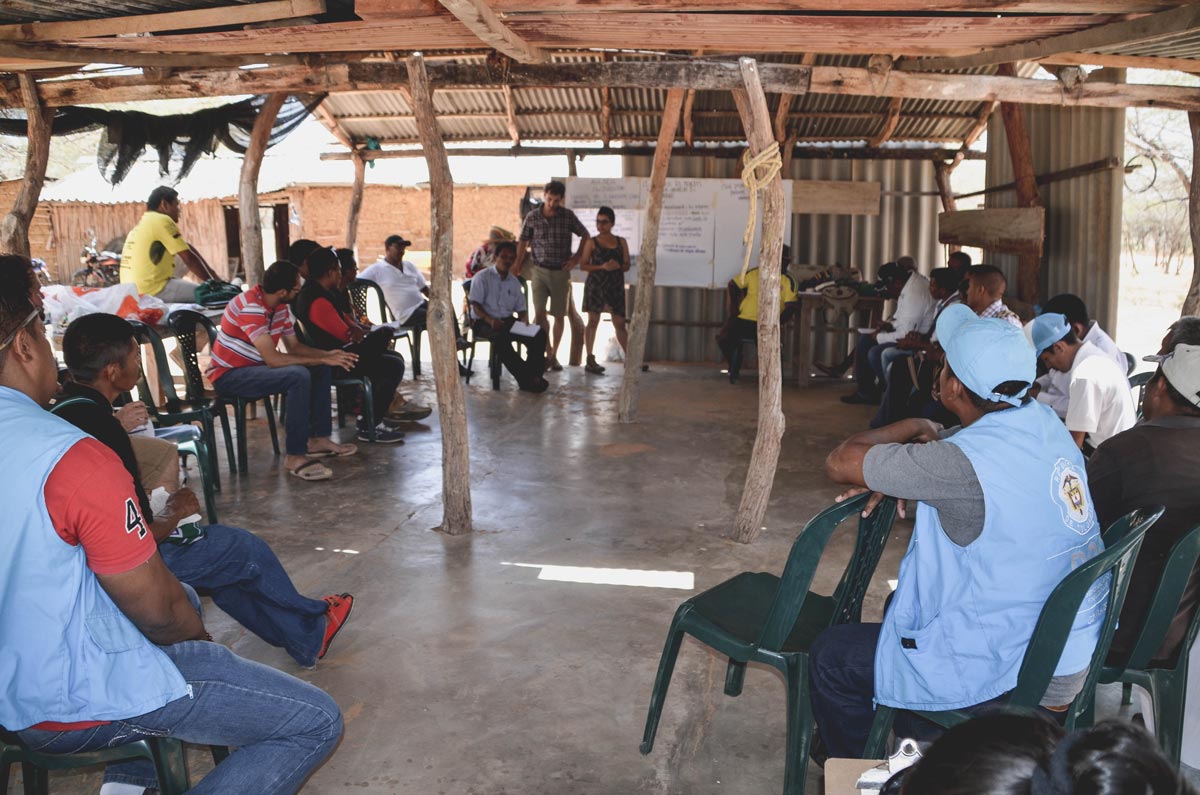The Wayuu is an Amerindian group that numbers approximately 450,000 and inhabits the semi-desert Guajira Peninsula straddling the Colombia-Venezuela border, on the Caribbean Sea coast. Here, Wájaro is:
1) Accompanying an association of Wayuu protestant leaders working to strengthen their communities.
2) Collaborating with international and national NGOs to provide basic educational training to community leaders.
3) Helping to develop a women’s artisan association to create income generation possibilities for Wayuu families.
4) Partnering with a local indigenous seminary to offer theological education to protestant leaders from across the Wayuu territory.
Continue on to read more about each initiative…

For over 500 years the Wayuu have shared a history of conflict and resistance, acceptance and exchange with the non-native arijuna (non-Wayuu). The Wayuu are one of the limited number of indigenous tribes throughout the Western Hemisphere to have effectively resisted European control. In large part, their success lies in their willingness to appropriate outside influences they see as beneficial for their survival.
One clear example of appropriation that has shaped their economic identity was adopting pastoralism from the early European settlers. The Wayuu were originally horticulturalists and foragers, but they incorporated livestock into their economy within 50 years after the first European contact. Today, they find a balance between maintaining long-standing cultural traditions and values, largely revolving around their semi-subsistent pastoral lifestyle and the adoption of Western marketing of their artisan products.
Another example of appropriating outside influences has been the Wayuu’s receptiveness to protestant missionaries. Though Catholicism did not spread in the Guajira as it did in most of Colombia, the protestant evangelical faith did, and today there are more than 50 evangelical denominations with churches in the Wayuu territory.
Though the Wayuu have been able to preserve their tribal identity and territory, life is by no means easy. Due to paramilitary violence, drought and water-intensive extractive industries, the Wayuu have faced increasing displacement and urbanization since the 1990s. The peace accords, though a step in the right direction for Colombia, could make life harder for the Wayuu.
The peace accords will likely create greater security and integration in the Colombia interior. As a result, peripheral regions like the Guajira could become more vulnerable to drug cartel operations linked with paramilitary groups that involve trafficking.
Too, due to greater political stability and security, experts are speculating exponential growth of foreign investment in extractive industries. An abundance of mineral resources makes the Guajira a likely site for a spike in multinational extractive industries that use large amounts of water in their operations.
Lastly, as a result of the dissolving of the FARC (and the continuing destabilization of Venezuela) two “kinds” of Wayuu will likely return home to the Guajira Peninsula. The first is the Wayuu “guerilla insurgent”, and the second is the “un-traditionalized” Wayuu returning from Venezuelan cities that fled due to the armed conflict.
A strong social fabric is the glue that holds society together and is highly correlative to a community’s ability to withstand external pressures like the ones cited above. It is a metaphor for how well the community members interact amongst themselves. The tighter the weave (the more frequently and positively the members interact with each other), the stronger the fabric is; the looser the weave, the weaker the fabric, and the more likely to tear and fray.
Enhancing social fabric, then, means to foment more and better interactions between members of the community. In doing so, they feel connected, capable, and trust each other. They are more willing to help someone when there is a need and work together to keep their community healthy and safe.
Churches are found in every nook and cranny of the Guajira, and are potential nodes around which social fabric can be built and strengthened. Wájaro is working with evangelical leaders to strengthen the social fabric of the communities dispersed throughout the Wayuu territory where churches are located. As Wayuu pastor and traditional leader, Ricaurte Enriquez adamantly explains, “Because of macro forces the social fabric of our communities is beginning to tear. Our vision is that the church take the lead on defending life in our God-given territory”.





